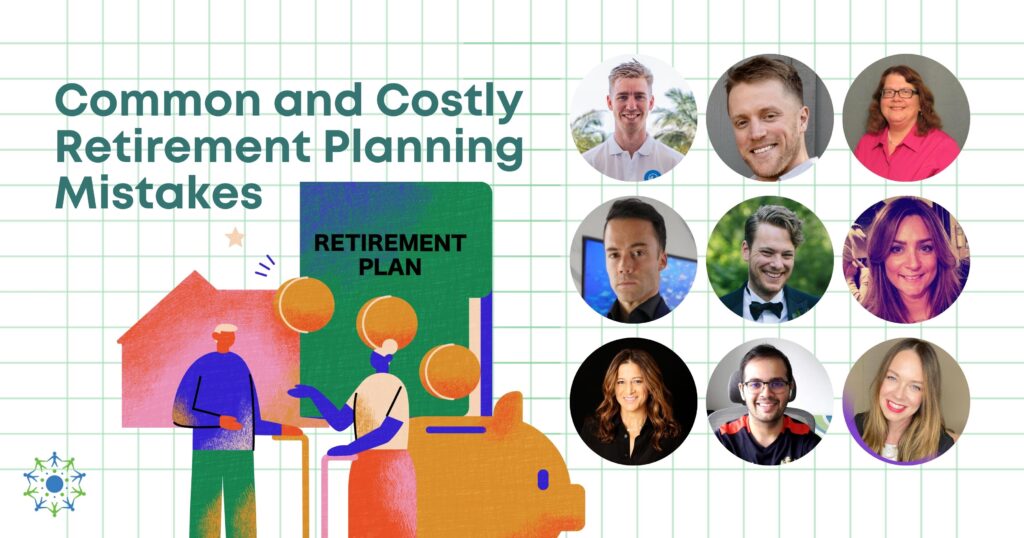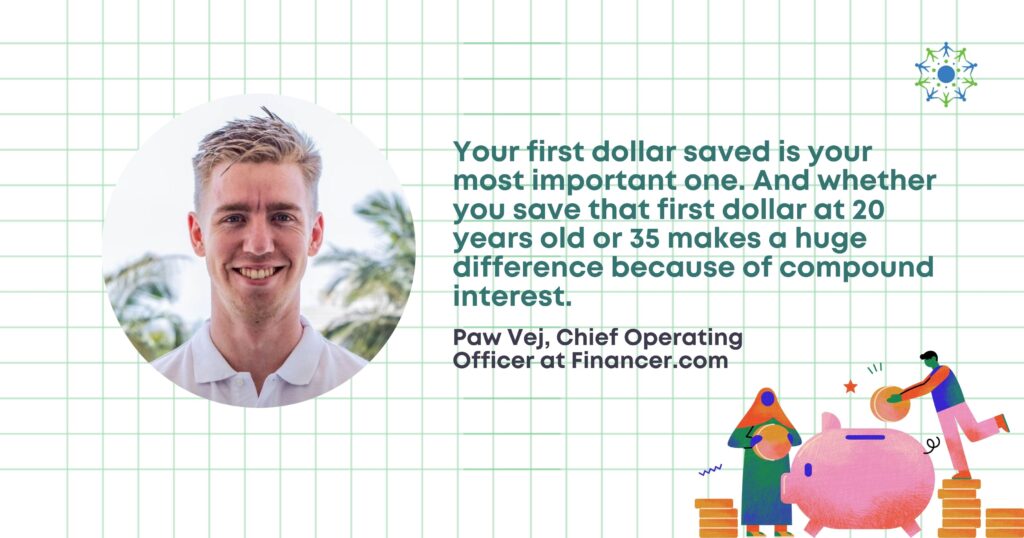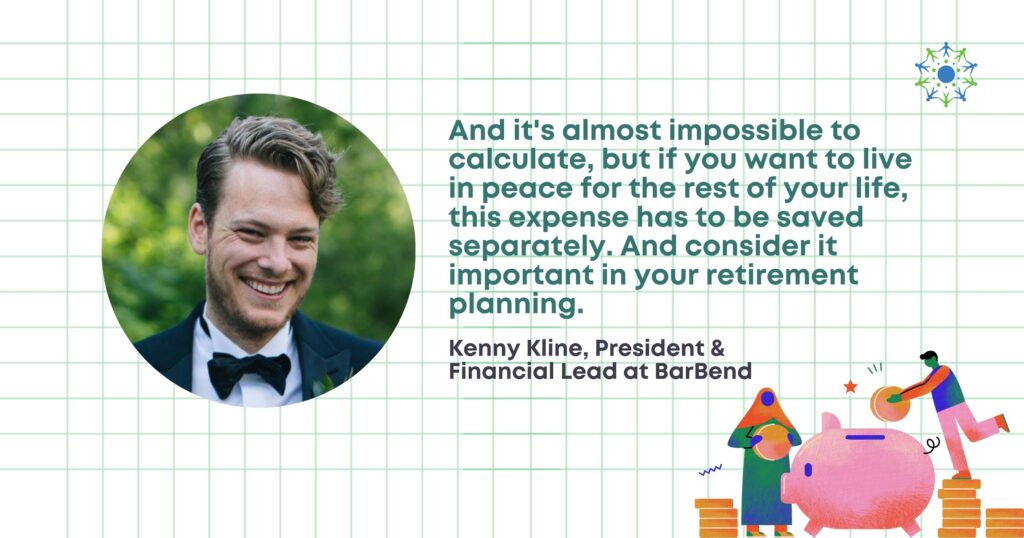What is one common and costly retirement planning mistake to avoid?
To help you avoid common and costly retirement planning mistakes, we asked financial planners and business leaders this question for their best advice. From not saving early on in life to poor tax planning, there are several retirement planning mistakes that you should be careful to avoid in order to build healthy financial security for your retirement.
Here are 13 common and costly retirement planning mistakes these leaders are mindful of:
- Not Saving Early On in Life
- Investing in Actively-Managed Funds With High Fees
- Not Working a 401K to Your Full Advantage
- Not Investing Your Savings
- Not Planning for Health Care Cost
- Investing Too Conservatively
- Relying Only on 401K Savings
- Retiring Too Soon
- Carrying Debt into Retirement
- Underestimating the Years You Live
- Cashing Out Your 401K When Changing Employers
- Withdrawing Early from Your 401k is a Major No-no
- Poor Tax Planning
Not saving early on in Life
Your first dollar saved is your most important one. And whether you save that first dollar at 20 years old or 35 makes a huge difference because of compound interest. When compound interest is working FOR you, time is your best friend. Consider that with a 5% annual return, $1,000 grows to $5,516 in 35 years. Sounds pretty good, right? Well it gets better. That same $1,000 becomes $11,467 in 50, more than doubling in those last 15 years. So not saving early on in your life is a very costly mistake. — Paw Vej, Chief Operating Officer, Financer.com
Investing in Actively-Managed Funds with High Fees
Most people have good intentions when it comes to retirement. They put money into their 401K or IRA and don’t get cute with how they invest it, sensing that the diversification of mutual funds and ETFs is better than individual stocks and risky assets. However, one thing that is often overlooked is the drag that high management fees can have on a portfolio’s performance.
Actively-managed funds, including popular target date funds, have very high management fees, especially in comparison to low-cost index funds. And while the difference in fees may seem minuscule (often less than 1%), they can really add up. For example, for a normal retirement portfolio earning 4% per year, over the course of 20 years, when a fund has a 1% management fee versus no management fee, the total portfolio can be worth $50,000 less in the end. Just based on the drag of high fees! So make sure to watch for funds with hefty expense ratios – it’s a common trap. — John Ross, Chief Executive Officer, Test Prep Insight
Not working a 401K to your Full Advantage
It’s unfortunate that many workers who participate in 401(k) plans either don’t take full advantage of an employer’s matching contributions or don’t increase their contributions when their income increases. The reticence to increase contributions is understandable given inflation putting stress on short-term purchasing needs, and making it even more difficult to pay attention to long-term goals. But not bringing your 401(k) up to the percentage of your employer’s matching contribution means you’re missing out on free money. And instead of falling victim to lifestyle creep whenever you get a raise, allocate the increase or a portion of it to your 401(k) to better secure your future.
There are several ways you can save on short-term purchases so you have the funds to increase your 401(k). This includes curtailing or eliminating unnecessary expenses from your budget, comparison-shopping on large outlays such as car and home insurance, and lobbying creditors for a lower interest rate. –– Karen Condor, Insurance Copywriter, ExpertInsuranceReviews.com
Not Investing your Savings
Don’t keep your money sitting in a savings account. Instead, the best way to manage your savings and plan for retirement is to invest this money in an index fund that tracks the S&P 500. You’ll earn interest on your money in the market, whereas when your money sits stagnant in a savings account, you’re actually losing out on money due to inflation. — Cesar Cruz, Co-Founder, Sebastian Cruz Couture
Withdrawing Early from your 401k
Cashing out your savings early. If you have money in a retirement plan like a 401K, taking out cash can have a major impact on your long-term savings. In addition to the penalties, taxes and fees you’ll pay for the withdrawal, you also lose out on compounding interest. Depending on how old you are, how much you withdraw and various market factors, this could end up costing you big time. Whenever possible, avoid withdrawing from your retirement savings unless you have a true need that you can’t cover in other ways.
— Vimla Black Gupta, Co-Founder & CEO, Ourself
Not Planning for Health Care Cost
There is an old saying “Disasters and diseases come without asking.” Therefore, health care costs are a huge expense that increases as you age. And it’s almost impossible to calculate, but if you want to live in peace for the rest of your life, this expense has to be saved separately. And consider it important in your retirement planning. But many people think that as healthy as they are now, they will remain the same in the future, and do not pay attention to the health care cost. With the passage of time, they realize how important it is to include health care costs in retirement planning. But at that time, they can’t do anything. Therefore, avoiding all these difficulties, including health care costs, is important in your retirement planning. — Kenny Kline, President & Financial Lead, BarBend
Investing too Conservatively
Investing too conservatively is a common retirement planning mistake. Many people are afraid of losing money, so they invest only in low-risk options, such as savings accounts or government bonds. While these investments are safe, they don’t offer the potential for high returns that you will need to reach your retirement goals. To reach your goals, you need to invest in a mixed bag of assets, including stocks, which have the potential for higher returns but also come with more risk. Working with a financial advisor can help you create an investment portfolio that meets your needs and helps you reach your goals. — Danielle Bedford, Head of Marketing, Coople
Relying only on 401K Savings
People who sign up for 401K benefits think they’re doing all they can to prepare for retirement. Don’t be too reliant on such a thing because that income stream can come to a screeching halt as a result of being laid off — or worse, as a result of nefarious business practices. It may seem like an extreme example, but ask any former Enron employee how their 401K investments turned out. You need more than what your company offers as far as retirement preparation, so seek out additional ways to save money for your future retirement. Find low-risk investments. Turn to random rewards banking. Own a rental property and set aside that income stream for your distant future. Don’t just rely on one source for retirement savings, because if it dries up or explodes on you, you’ll have nothing. — Trevor Ford, Head of Growth, Yotta
Retiring too Soon
Retiring too soon is a common and costly retirement planning mistake to avoid. Continuing to work for a few more years can increase your retirement income by up to one-third. The average retirement age for most people, according to the Social Security Administration, is between 66 and 67, but many Americans don’t wait that long. Working until your full retirement age will help you avoid the Social Security benefit reductions for early filing. You can continue to make contributions to your retirement savings plan at the same time, creating additional balances that can be used to make market investments.
Retirement entails leaving a full-time job or career that a person has held for a long time. There are numerous options, such as working part-time in your current job or career; beginning a new job or career, part-time or full-time; working as a bridge job for a few years until full-time retirement; working for yourself or owning a business; or volunteering for a cause you care about. — Raviraj Hegde, Head of Growth, Donorbox
Carrying Debt into Retirement
If you’ve spent your whole life saving for retirement, it’s a bit of a buzzkill to consider working longer to finish paying off debts, but it might be worth it. A common mistake people make is carrying existing debt into retirement. Your social security and savings will already need to last you a long time; you don’t want to overspend it on debt payments and run out down the line. To protect your long-term budget, it’s important to enter retirement debt-free. — Rachel Reid, CEO, Subtl Beauty
Underestimating the Years you Live
No one knows how long you will live, but if you are going to retire, you should plan for near eighty or ninety. But calculating seventy at the time of retirement is a big mistake. Because you will run out of money very quickly, which will create many problems in the future. And I think this is a common and costly retirement planning mistake. To avoid this, you should calculate eighty or ninety, so that you don’t have to face any problems in the future, and can live comfortably. And plan in such a way that all your expenses are included.
— Joe Troyer, CEO & Growth Advisor, Digital Triggers
Cashing out your 401K when Changing Employers
Cashing out your 401k when you change employers. You’ll pay taxes and penalties, and the whole point of it was for retirement, not to spend now, right? Cashing it out is a double hit on the value and is completely out of line with what your retirement investing strategy should be. You can always leave it put, but it’s often just easier to roll it into your new employer’s plan. — Matthew Hamilton, Vice President, People Analytics & HRIS, Protective Life
Poor Tax Planning
In my experience, one of the most common and costly retirement planning mistakes to avoid is poor tax planning. Many people assume that because they’ve saved enough to retire, they can just live off their savings and not worry about taxes. However, the truth is that even if you’re in a low tax bracket now, you might be in a higher one once you retire – and if so, you’ll pay more in taxes on your income than you would have paid as an employee. That’s why it’s important to consider your tax rate now and when it might change as well as what strategies you can use to reduce your overall tax burden. –– Amy Gilmore, Managing Editor, Learn Financial Strategy






